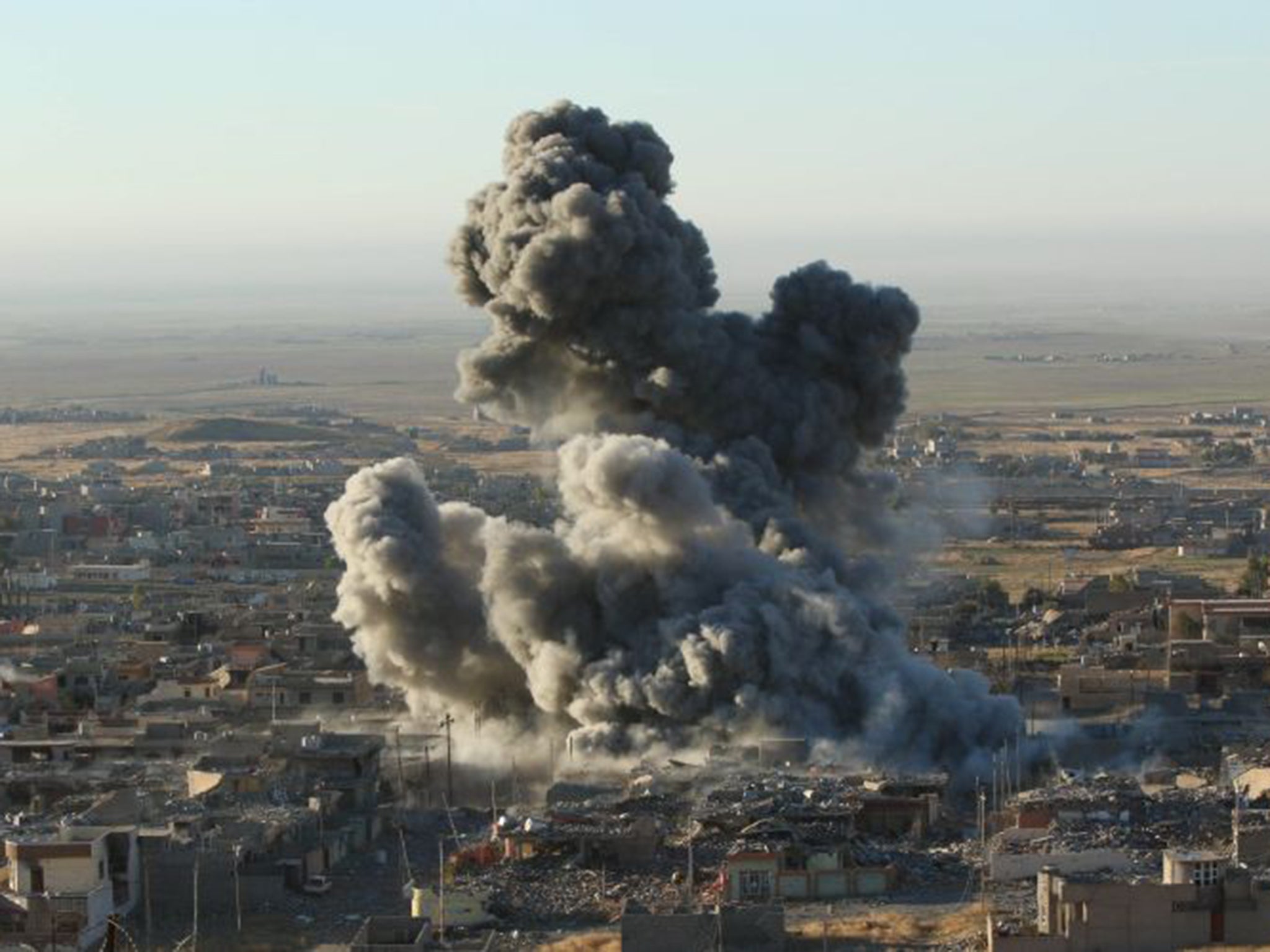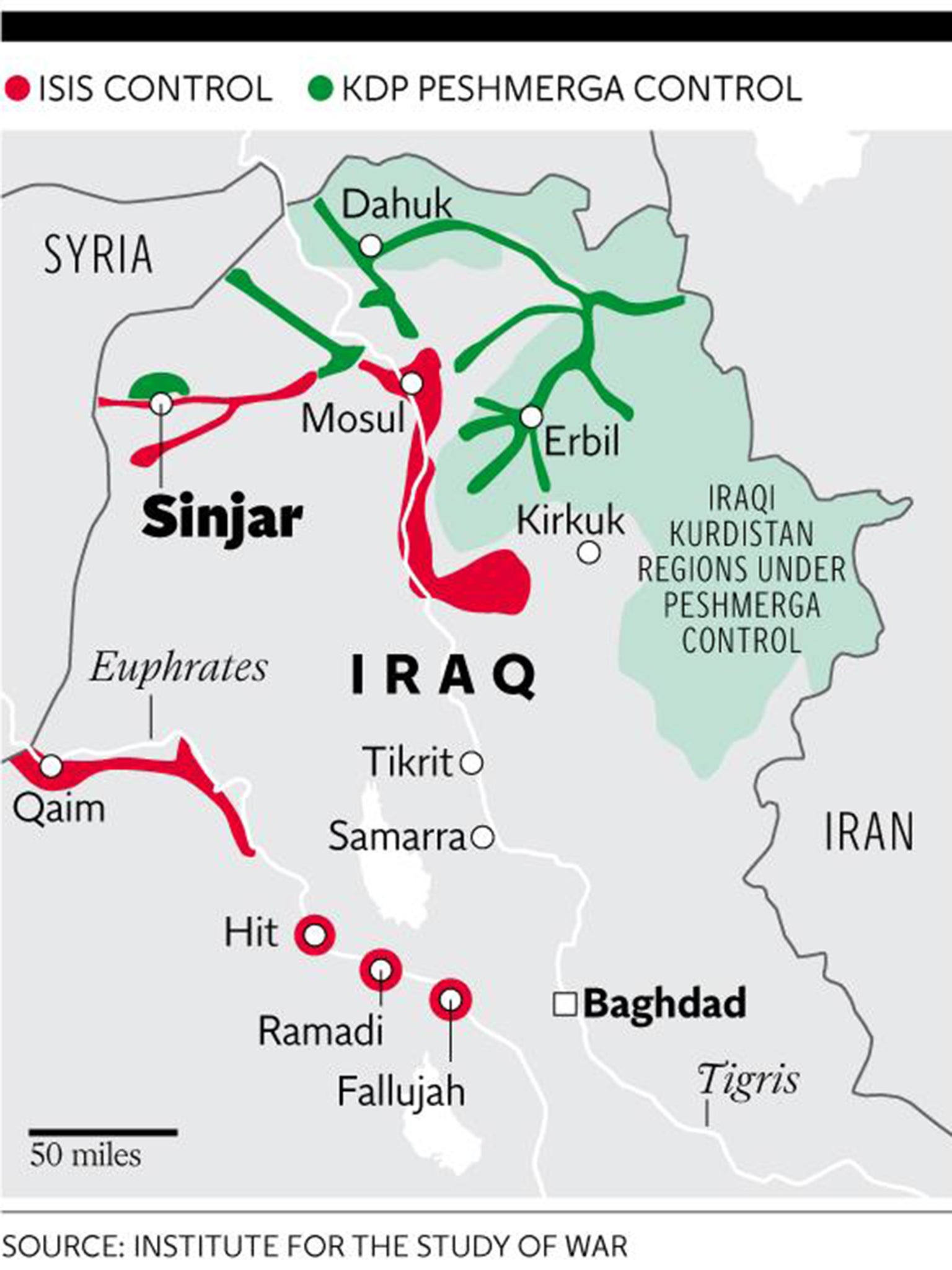Sinjar offensive: Attack gives Iraq's Yazidis the chance to finally take revenge on Isis
Kurdish forces, backed by the US, have launched an attack aimed at reclaiming the northern Iraqi town from the militants. It comes a year after jihadists took over the area, massacring hundreds of Yazidis

Your support helps us to tell the story
From reproductive rights to climate change to Big Tech, The Independent is on the ground when the story is developing. Whether it's investigating the financials of Elon Musk's pro-Trump PAC or producing our latest documentary, 'The A Word', which shines a light on the American women fighting for reproductive rights, we know how important it is to parse out the facts from the messaging.
At such a critical moment in US history, we need reporters on the ground. Your donation allows us to keep sending journalists to speak to both sides of the story.
The Independent is trusted by Americans across the entire political spectrum. And unlike many other quality news outlets, we choose not to lock Americans out of our reporting and analysis with paywalls. We believe quality journalism should be available to everyone, paid for by those who can afford it.
Your support makes all the difference.It was just after dawn when the 7,500 peshmerga fighters began to snake down from the mountain towards the city below. A long convoy of armoured lorries, tanks, mounted machine guns and artillery advanced with caution to a backdrop of earth-shaking thuds from US-led coalition air strikes and plumes of smoke where attacking planes had found their targets in the distance.
Their advance was part of a long-awaited offensive unleashed by Kurdish forces, aimed at driving Isis from the northern Iraqi town of Sinjar and establishing positions along a route used by Isis to shift supplies between its two main strongholds in Iraq and Syria, the coalition said. The forces also hope to establish a wider buffer zone around the city to protect it from artillery.
A year ago Sinjar was the site of some of the worst atrocities committed by Isis as the jihadist Sunni group unleashed a savage onslaught against Iraq’s minority Yazidis. Isis massacred hundreds, taking women and girls prisoner for sex and marriage, and causing thousands to flee up Sinjar mountain in a desperate attempt to reach safety – where they were besieged for weeks.
This was the moment when Yazidi fighters, who were among the wider Kurdish forces, finally had their chance to hit back. On the western outskirts of Sinjar, Yazidi fighters milled around the shell of a partly destroyed house that had been occupied by an Isis fighter until that morning. The dead man’s body lay in the backyard, a victim, the fighters said, of an air strike earlier that day. The commander sat on the half-smashed roof of the home looking through binoculars into Sinjar itself as it was gradually surrounded by peshmerga fighters. Some 1,500 Yazidis were taking part in the offensive, he said. One volunteer Yazidi fighter, Lukman Ido, 40, who is from a town north of the mountain and uses an AK‑47 with ammunition he buys himself, said: “I am defending my land. The peshmerga did their best, the PKK did their best but we have got to protect our land.” In all, he said, 100 members of his extended family had also volunteered to join the fight.
The offensive on Sinjar city had been delayed by disputes between different Kurdish militias on the mountain above it. When Isis attacked the Yazidis last year, the peshmerga fighters, the army of the autonomous Iraqi Kurdistan, were outgunned and forced to retreat. It was fighters aligned to the PKK, the Kurdish nationalist militia, who carved the pathway out from the mountain that enabled most of the besieged Yazidis to escape to safety.

The peshmerga asked the PKK not to take part in the attack to retake Sinjar, one PKK commander said, but he added that his fighters were ignoring that request and were joining the battle anyway.
General Zaim Ali, commanding the peshmerga forces, stood on the western front and watched as his tanks and heavy artillery moved slowly towards the city. Heavy diggers and teams seeking to disable the many hidden IEDs and other booby traps set by Isis led the way.
General Ali said that he expected his troops to meet little resistance in the city, despite recent signs that Isis had brought in several hundred reinforcements. He said he expected to find mainly snipers and car bombs obstructing his forces’ entry.
Major Jamal Wasi was at the front of the peshmerga offensive in a unit he described as the “death squad”. He is an engineer working to deactivate IEDs ahead of the brunt of the peshmerga offensive. He has had no training and doesn’t wear body armour. He said that the day before the attack he cleared 23 IEDs planted by Isis on the road leading to the key Sinjar-Syria highway.
Another officer, Major Zaim Ali, said the attempt to retake Sinjar – previously delayed, he said, by bad weather – was crucial. “It belongs to the Yazidis. Isis killed them and took thousands of them prisoner. We feel that atrocity, and we want to show that Daesh are not that strong,” he said, using the Arabic name for Isis.
The hope is that a victory in Sinjar could give the Kurds, Iraqi government forces and Shia militias momentum in their efforts to defeat Isis elsewhere in Iraq and Syria. By Thursday night the Kurds claimed to have captured three villages close to Sinjar, and to have penetrated parts of Highway 47, a supply route between Raqqa in Syria and the Iraqi city of Mosul, both of them bastions of what Isis calls the “Islamic State”.
“The peshmerga will continue operations to re-establish government control over key portions of the areas,” a coalition statement said.
Elsewhere it was reported that the US expected it would take two to four days to secure Sinjar and another week to finalise “clearing operations”, a US military official told Reuters, speaking on condition of anonymity. American military advisers are with Kurdish commanders near Sinjar mountain but are positioned well back from the fighting, a US military spokesman said.
US Army Colonel Steve Warren told Reuters some advisers were also on Sinjar mountain, working with the Kurdish peshmerga forces to advise and assist with the development of targets for air strikes. The US estimated that 60 to 70 Isis fighters were killed in coalition air strikes on Thursday, Colonel Warren said.
Join our commenting forum
Join thought-provoking conversations, follow other Independent readers and see their replies
Comments